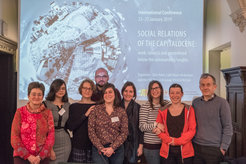Report on the Conference "Social Relations of the Capitalocene"
This was the last major Workshop of Chris Hann’s ERC project “Realising Eurasia. Civilization and Moral Economy in the 21st Century” (Grant No 340854). Convened by Hann and project Coordinator Lale Yalçın-Heckmann, the goal on this occasion was to draw out some of the larger implications of the empirical and theoretical research carried out in the team since 2014.

Presentations by 7 REALEURASIA members (5 doctoral students and 2 postdocs, who focused primarily on their case studies of family businesses across Eurasia) were therefore juxtaposed with papers by a range of scholars with expertise in other regions and even other disciplines. The ecological dimension flagged in the title of the meeting was addressed most explicitly in the opening and closing keynote lectures. Gareth Dale began by noting that even Davos has been lacking good January snow in recent years. His argument that capitalism “eats time and erases nature” was supported with detailed analyses of works by Thomas Mann and Walter Benjamin: the “abstract time” of modern Europeans was contrasted with the “ecological time” of the Nuer, as studied by E. Evans-Pritchard. Mark Harvey, in closing the meeting two days later, was less confident than Dale in generalizing about “capitalism”. Drawing empirical data from recent developments in China and Brazil, Harvey’s concept of “sociogenesis” offered no general laws, but instead the Polanyian institutionalization of markets in varying socio-cultural settings and resource environments. In the third keynote, Ayşe Buğra also drew heavily on Polanyi: specifically, his notions of “embeddedness” and the “double movement” (a prime example being the “polarizing populism” of political Islam in contemporary Turkey).
The first session broke new ground for our Eurasia-focused Department: all three papers were devoted to the Americas! Andrew Ofstehage’s explained how US farmers expand their Agribusiness in Brazil – in ways that make their home farms in the mid-West of the US seem peasant-like in their intimacy, since (at least until recently) the family-land bond was still strong. Questions of identity and alienation came up again later in the meeting in factory studies (by Alejandra Jiménez, who examined a Volkswagen company town in Mexico, and our own Ivan Rajkovic). Moral dimensions of welfare provision in China and of the consumption of “fair trade” products in the United States were investigated by Tom Cliff and Laurel Zwissler respectively. Courtney Lewis and Leilah Vevaina showed how factors of ethnicity, scale and institutional (legal) form were decisive in determining economic outcomes for Eastern Band Cherokee Indians in North Carolina (Lewis) and Parsis in Mumbai (Vevaina). In addition to these external guests and REALEURASIA members, the discussions were enriched throughout by the contributions of other members of the Department and numerous longstanding friends of the MPI, some of whom served as formal Discussants.
On this occasion it is unlikely that we shall proceed directly to a conference volume; the contributions were simply too diverse. But apart from the intrinsic value of the written papers and the oral contributions of our visitors, there is no doubt that our local team benefited greatly from more than two days of intensive interaction. This stimulus will be reflected indirectly in dissertations and other publications as the project “Realising Eurasia” enters its final phase.
